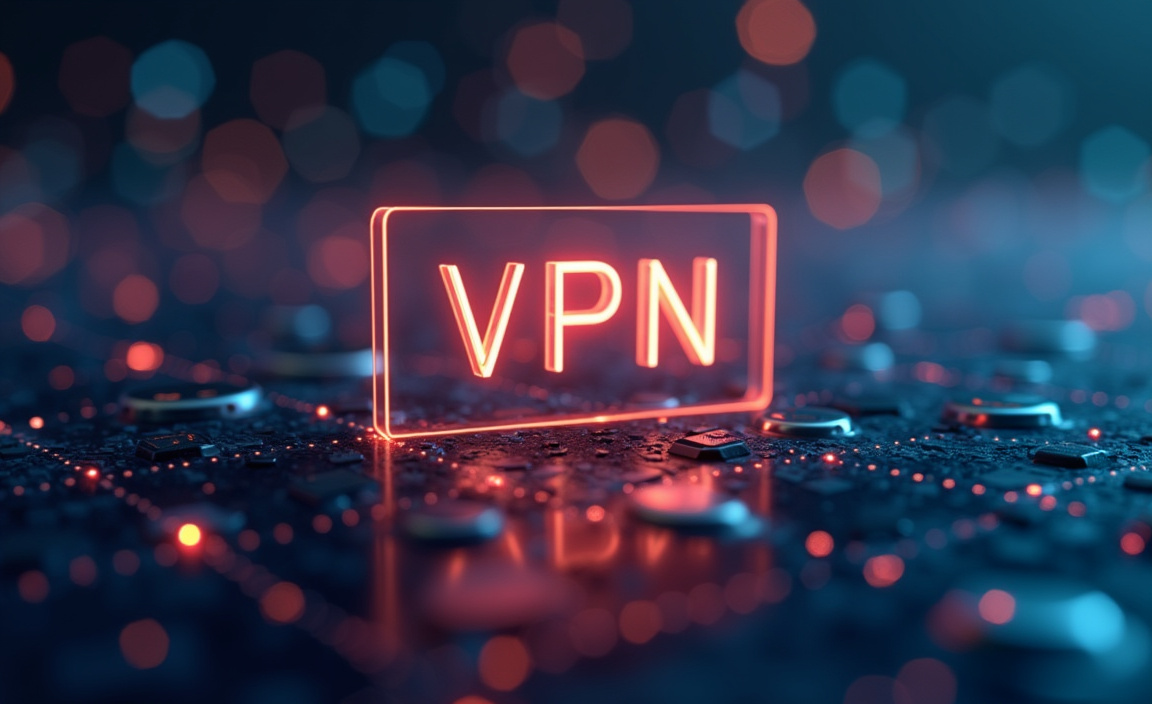The Future of VPN Technology: Trends in 2025

Table of Contents
The Evolving Need for Online Privacy and Security
In an increasingly interconnected world, where our digital footprints expand daily and data breaches dominate headlines, the importance of online privacy and security has never been more paramount. Virtual Private Networks (VPNs) have transitioned from niche tools for tech enthusiasts to essential safeguards for individuals and organizations seeking to protect their sensitive information and maintain control over their online experiences. As we navigate the complexities of the modern digital landscape, understanding the evolving nature of VPN technology is crucial for making informed decisions about our security posture.
This article delves into the future of VPN technology, exploring the emerging trends that are shaping its trajectory in 2025 and beyond. We aim to dissect the key factors driving these changes, analyze their potential impact on user security choices, and provide a comprehensive 2025 forecast for the VPN landscape. Grasping these developments is critical for anyone seeking to effectively protect their online privacy and security in the years to come.
The digital realm is constantly evolving, presenting new challenges and vulnerabilities. The sophistication of cyber threats, including malware, phishing attacks, and sophisticated surveillance techniques, necessitates a proactive and adaptable approach to online security. VPN technology, as a cornerstone of digital defense, must continually evolve to remain effective against these ever-present threats.
Emerging trends, such as the integration of artificial intelligence (AI) for threat detection, the adoption of quantum-resistant encryption to future-proof data security, and the rise of decentralized VPNs (dVPNs) offering enhanced privacy and censorship resistance, are poised to redefine the capabilities and applications of VPNs. By gaining a solid understanding of these trends, users can make more informed security choices, selecting VPN solutions that align with their specific needs and security priorities and leveraging the full potential of VPN technology to safeguard their digital lives. Furthermore, the growing awareness of data privacy among consumers is a significant catalyst for innovation within the VPN industry.
As individuals become more conscious of how their data is collected, used, and potentially misused, they are demanding greater transparency and control over their online information. This heightened awareness is fueling the demand for more robust, user-friendly, and privacy-focused VPN solutions. VPN providers are responding by developing intuitive interfaces, strengthening security protocols, and offering a wider range of customizable features tailored to specific user needs and preferences.
The future of VPN technology is therefore not solely about enhancing security but also about empowering users with greater agency over their digital privacy. The ability to easily manage privacy settings, understand data handling practices, and customize security features will become increasingly important factors in user adoption and satisfaction. This shift towards user empowerment is driving VPN providers to prioritize transparency, simplicity, and control in their product development.
Ultimately, the interplay between technological advancements, evolving cyber threats, and increasing user awareness is shaping the future of VPN technology in profound ways. By vigilantly examining these forces, we can gain valuable insights into the potential challenges and opportunities that lie ahead. Understanding the trajectory of VPN technology allows us to proactively adapt our security strategies, choose the right tools, and ultimately navigate the digital world with greater confidence and control.
This article aims to provide that understanding, acting as a guide to the emerging trends and future possibilities within the realm of VPN technology.
Several key factors are acting as powerful engines driving the evolution of VPN technology, each contributing to the emerging trends that will ultimately define its future trajectory. One of the most significant drivers is the relentless and ever-increasing sophistication of cyber threats. As malicious actors develop more advanced and nuanced techniques to bypass traditional security measures, VPN providers are engaged in a perpetual arms race, constantly innovating to stay ahead of the curve and safeguard their users.
This necessitates the continuous incorporation of advanced encryption algorithms, such as post-quantum cryptography, the robust implementation of multi-factor authentication to prevent unauthorized access, and the proactive leveraging of threat intelligence feeds to identify and mitigate potential risks before they can materialize. The dynamic nature of the threat landscape demands a proactive and adaptive security posture, pushing VPN providers to continuously evolve their defenses. Another critical driver is the burgeoning demand for enhanced privacy among internet users.
As individuals become increasingly aware of the pervasive extent to which their online activities are tracked, monitored, and potentially exploited by various entities, they are actively seeking tools and strategies that empower them to protect their privacy and regain control over their personal data. VPNs offer a valuable and readily accessible solution by encrypting internet traffic, effectively shielding it from eavesdropping, and masking IP addresses, making it significantly more difficult for websites, advertisers, and other third parties to track user activity and build detailed profiles. This growing demand for privacy is fundamentally driving the development of more user-friendly, transparent, and privacy-centric VPN solutions that prioritize user control and data minimization.
Providers are responding by implementing clear and concise privacy policies, offering enhanced anonymity features, and undergoing independent audits to verify their privacy claims. The increasing adoption of mobile devices as primary internet access points is also profoundly shaping the future of VPN technology. As more and more people rely on smartphones and tablets for their daily online activities, the need for seamless and effective mobile VPNs is growing exponentially.
Mobile VPNs offer the same core security and privacy benefits as their desktop counterparts, but they are specifically engineered for use on mobile devices, taking into account the unique challenges and constraints of the mobile environment. This includes features such as automatic connection to a VPN server when connecting to untrusted public Wi-Fi networks, optimized performance for mobile data connections to minimize battery drain, and integrated security features to protect against mobile-specific threats. Finally, the disruptive emergence of new and innovative technologies, such as artificial intelligence (AI) and blockchain, is poised to revolutionize the VPN landscape.
AI can be leveraged to enhance VPN security by intelligently detecting and preventing malicious activity, autonomously optimizing network performance, and providing personalized security recommendations. Blockchain technology, on the other hand, can be used to create decentralized VPNs (dVPNs) that are inherently more resistant to censorship, surveillance, and single points of failure. These dVPNs offer users unprecedented levels of privacy, security, and control over their online connections.
The convergence of these key drivers – evolving cyber threats, the demand for privacy, mobile adoption, and the emergence of new technologies – is creating a dynamic and rapidly evolving VPN ecosystem. As providers race to innovate and adapt to the changing needs and expectations of users, we can anticipate even more groundbreaking advancements in VPN technology in the years to come, ultimately leading to a more secure and privacy-respecting online experience for everyone.
Several notable and transformative emerging trends in VPN technology are poised to fundamentally reshape the landscape of online security, profoundly influencing user security choices and dictating the direction of future development. One of the most prominent and impactful trends is the increasing and sophisticated integration of artificial intelligence (AI) into VPN solutions. AI algorithms, powered by machine learning techniques, possess the capability to analyze vast amounts of network traffic data in real-time, identifying subtle anomalies, detecting suspicious patterns, and predicting potential threats with remarkable accuracy.
This proactive threat detection capability allows VPNs to effectively block malicious activity, such as malware infections, phishing attacks, and distributed denial-of-service (DDoS) attacks, before they can compromise user devices or data. AI can also be used to automatically optimize VPN server selection based on network conditions and user location, ensuring the fastest and most secure connection possible. The integration of AI significantly enhances the overall security of VPNs and reduces the risk of users falling victim to increasingly sophisticated cyberattacks.
Another significant and future-proof trend is the growing adoption of quantum-resistant encryption algorithms. As quantum computers continue to advance in computational power, they pose an increasing threat to traditional encryption algorithms, which are vulnerable to being cracked by quantum computing techniques. Quantum-resistant encryption algorithms, also known as post-quantum cryptography (PQC), are specifically designed to withstand attacks from even the most powerful quantum computers, ensuring that user data remains secure and protected against future decryption efforts.
This technology is becoming increasingly critical as the threat of quantum computing looms on the horizon, and early adoption of quantum-resistant encryption is essential for long-term data security. The rise of decentralized VPNs (dVPNs) represents another noteworthy and paradigm-shifting trend within the VPN industry. dVPNs are built on blockchain technology and operate on a peer-to-peer network, eliminating the need for a centralized server infrastructure.
This decentralized architecture provides several key advantages, including enhanced resistance to censorship and surveillance, as there is no single point of control that can be targeted by governments or other entities. dVPNs also offer users greater privacy and anonymity, as their data is not stored on a central server and their traffic is routed through a network of distributed nodes, making it more difficult to trace their online activities. Furthermore, the increasing emphasis on user experience is driving significant improvements in VPN interfaces and features.
VPN providers are recognizing the importance of providing intuitive, user-friendly interfaces that are easy to navigate, even for users with limited technical expertise. They are also adding a range of convenient and value-added features, such as automatic connection to the VPN server when connecting to untrusted public Wi-Fi networks, split tunneling, which allows users to selectively route traffic through the VPN, and integrated ad blocking and malware protection to enhance their overall online experience. Ultimately, these emerging trends in VPN technology are providing users with a wider range of security choices, empowering them to tailor their VPN solutions to their specific needs and preferences.
By understanding and embracing these trends, users can make informed decisions about which VPN solutions are best suited to their individual requirements, whether it's leveraging AI-powered security features, adopting quantum-resistant encryption for long-term data protection, or embracing the decentralized architecture of dVPNs for enhanced privacy and censorship resistance.
The emerging trends in VPN technology are having a profound and multifaceted impact on user security choices, fundamentally reshaping the way individuals and organizations approach online privacy and security. As the VPN landscape evolves, users are presented with a broader range of options, each offering unique features, capabilities, and security guarantees. This expanded selection empowers users to make more informed decisions about which VPN solutions best align with their specific needs, priorities, and threat models.
However, navigating this increasingly complex landscape also requires a deeper understanding of the underlying technologies, security protocols, and privacy policies of different VPN providers. One of the most significant impacts on user security choices is the growing availability of AI-powered VPNs. These advanced VPNs leverage artificial intelligence to enhance threat detection, prevent malicious activity, and automatically optimize network performance.
For users who prioritize maximum security and are seeking proactive protection against cyber threats, AI-powered VPNs offer a compelling solution. However, it's important for users to carefully evaluate the specific AI algorithms used by different VPN providers, as well as their data handling practices, to ensure that their privacy is not compromised in the process. The increasing adoption of quantum-resistant encryption is also significantly impacting user security choices.
As the threat of quantum computing looms on the horizon, users who are concerned about the long-term security of their data are increasingly seeking VPNs that incorporate quantum-resistant encryption algorithms. These algorithms are designed to withstand attacks from even the most powerful quantum computers, ensuring that user data remains secure for years to come. Choosing a VPN with quantum-resistant encryption is a proactive step towards future-proofing data security and mitigating the risks associated with quantum computing.
The rise of decentralized VPNs (dVPNs) is presenting users with a fundamentally different approach to online privacy and security. dVPNs offer a more censorship-resistant and privacy-focused alternative to traditional VPNs, as they operate on a peer-to-peer network and eliminate the need for a central server infrastructure. For users who prioritize anonymity, freedom of expression, and protection against government surveillance, dVPNs offer a compelling solution.
However, it's important for users to carefully consider the technical complexities and potential performance limitations of dVPNs before making a decision. Furthermore, the increasing focus on user experience is driving significant improvements in VPN interfaces and features, making VPNs more accessible and user-friendly for a wider range of individuals. This is particularly important for users who are not technically savvy and may have previously been intimidated by the complexities of VPN technology.
As VPN providers continue to simplify their interfaces, add more intuitive features, and provide better customer support, VPNs are becoming an increasingly viable option for mainstream users seeking to protect their online privacy. In navigating the future of VPN technology, users must carefully weigh the various factors that influence their security choices, including the specific threats they face, their level of technical expertise, and their budget. By understanding the emerging trends in VPN technology and carefully evaluating the different solutions available, users can make informed decisions about which VPNs are best suited to their needs and achieve a greater level of online privacy and security.
The future VPN landscape empowers users with choices, demanding a thoughtful approach to security.
VPNs in Subscription Services: Securing the Future of Online Platforms
As we look towards the future of VPN technology, several key trends and predictions emerge, painting a picture of a dynamic and evolving landscape set to further redefine online security and privacy in the years to come. A 2025 forecast suggests that the integration of artificial intelligence will become even more pervasive, with AI-powered VPNs offering increasingly sophisticated threat detection and proactive security measures. We can expect to see AI algorithms become more adept at identifying zero-day exploits, detecting advanced persistent threats (APTs), and adapting to evolving attack patterns in real-time.
This will lead to a more automated and intelligent approach to VPN security, reducing the reliance on manual configuration and human intervention. Another prominent trend will be the accelerated adoption of quantum-resistant encryption. As quantum computing technology continues to advance, the need to protect data against future decryption efforts will become increasingly urgent.
We can expect to see more VPN providers implementing quantum-resistant encryption algorithms across their networks, ensuring the long-term security of user data. This will involve a gradual transition from traditional encryption methods to post-quantum cryptography, requiring significant investment in infrastructure and research. The decentralized VPN (dVPN) market is also poised for significant growth, driven.
by increasing demand for censorship resistance, enhanced privacy, and greater user control. We can anticipate the emergence of more dVPN platforms, offering a wider range of features, pricing models, and governance structures. dVPNs will likely appeal to users who are particularly concerned about government surveillance, internet censorship, and data privacy.
However, the dVPN market will also face challenges related to scalability, performance, and regulatory compliance. Furthermore, the focus on user experience will continue to intensify, with VPN providers striving to create more intuitive, user-friendly, and accessible interfaces. This will involve simplifying the VPN setup process, providing more seamless connectivity, and offering more personalized security recommendations.
We can also expect to see more VPNs integrating with other security tools, such as password managers, antivirus software, and firewalls, to provide a more comprehensive security solution. Looking beyond 2025, several longer-term trends are likely to shape the future of VPN technology. One such trend is the convergence of VPNs with other privacy-enhancing technologies, such as Tor and secure messaging apps.
This convergence could lead to the development of hybrid solutions that offer a combination of VPN encryption, Tor anonymity, and secure communication features. Another trend is the increasing use of VPNs in IoT (Internet of Things) devices to protect against hacking and data breaches. As more and more devices become connected to the internet, the need to secure these devices with VPNs will become increasingly important.
In conclusion, the future of VPN technology is characterized by continuous innovation, increasing sophistication, and a growing focus on user experience and privacy. As VPNs evolve to meet the challenges of the modern digital landscape, they will continue to play a critical role in protecting online security and empowering users to control their digital lives. By understanding these trends and predictions, users can make informed decisions about their VPN choices and stay ahead of the curve in the ever-evolving world of online security.
The future of VPNs is not just about security; it's about empowering individuals in the digital age.
Stay Updated
Get the latest VPN news, tips, and exclusive deals to your inbox.




